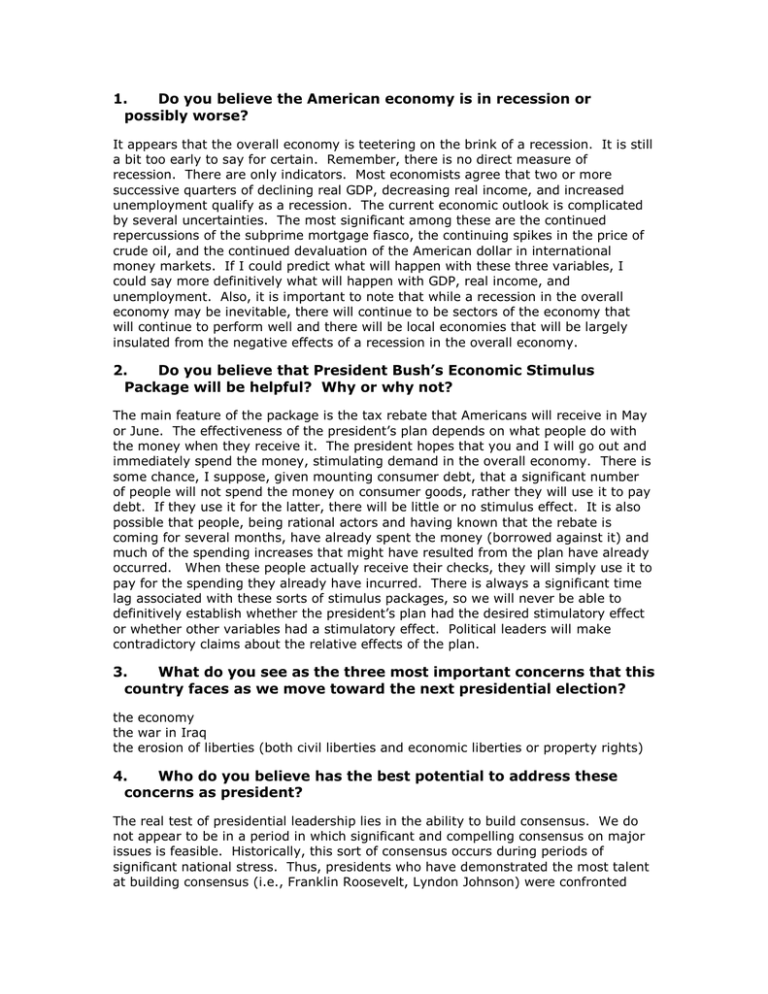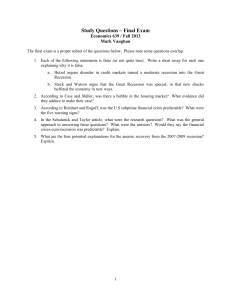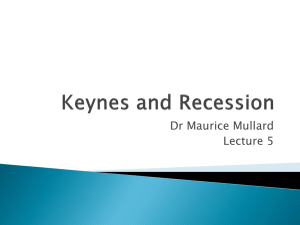1. Do you believe the American economy is in recession or
advertisement

1. Do you believe the American economy is in recession or possibly worse? It appears that the overall economy is teetering on the brink of a recession. It is still a bit too early to say for certain. Remember, there is no direct measure of recession. There are only indicators. Most economists agree that two or more successive quarters of declining real GDP, decreasing real income, and increased unemployment qualify as a recession. The current economic outlook is complicated by several uncertainties. The most significant among these are the continued repercussions of the subprime mortgage fiasco, the continuing spikes in the price of crude oil, and the continued devaluation of the American dollar in international money markets. If I could predict what will happen with these three variables, I could say more definitively what will happen with GDP, real income, and unemployment. Also, it is important to note that while a recession in the overall economy may be inevitable, there will continue to be sectors of the economy that will continue to perform well and there will be local economies that will be largely insulated from the negative effects of a recession in the overall economy. 2. Do you believe that President Bush’s Economic Stimulus Package will be helpful? Why or why not? The main feature of the package is the tax rebate that Americans will receive in May or June. The effectiveness of the president’s plan depends on what people do with the money when they receive it. The president hopes that you and I will go out and immediately spend the money, stimulating demand in the overall economy. There is some chance, I suppose, given mounting consumer debt, that a significant number of people will not spend the money on consumer goods, rather they will use it to pay debt. If they use it for the latter, there will be little or no stimulus effect. It is also possible that people, being rational actors and having known that the rebate is coming for several months, have already spent the money (borrowed against it) and much of the spending increases that might have resulted from the plan have already occurred. When these people actually receive their checks, they will simply use it to pay for the spending they already have incurred. There is always a significant time lag associated with these sorts of stimulus packages, so we will never be able to definitively establish whether the president’s plan had the desired stimulatory effect or whether other variables had a stimulatory effect. Political leaders will make contradictory claims about the relative effects of the plan. 3. What do you see as the three most important concerns that this country faces as we move toward the next presidential election? the economy the war in Iraq the erosion of liberties (both civil liberties and economic liberties or property rights) 4. Who do you believe has the best potential to address these concerns as president? The real test of presidential leadership lies in the ability to build consensus. We do not appear to be in a period in which significant and compelling consensus on major issues is feasible. Historically, this sort of consensus occurs during periods of significant national stress. Thus, presidents who have demonstrated the most talent at building consensus (i.e., Franklin Roosevelt, Lyndon Johnson) were confronted with compelling national challenges, making the task of building consensus on national policy possible (i.e., the Great Depression, the Civil Rights movement). While pundits discuss the current issues as if they are crises, by comparison, they are not. Thus, the political incentives remain present to pursue incremental solutions. Incrementalism of this sort leaves the impression that the political system is gridlocked or stalemated, reinforcing the perception that our problems are intractable at best and dire at worst. I have no faith in individual leaders to solve the issues I outlined in #3, or any other problems. The founders of our system of government created institutional arrangements that are designed to frustrate strong, assertive leadership. They wanted to make it difficult for government to act unless significant consensus could be established across several institutions (House of Representatives, the Senate, and the president) that a given course of action was appropriate. Americans say they want political leaders to put politics aside and “do what’s right for the country.” Our founders were not so naïve. An argument could be made that when our political leaders are unable to come to agreement on national policy in a quick and efficient manner with limited debate, the system is working precisely the way the founders intended. It might also be taken as an indication that the problems with which we are currently confronted are not nearly as serious as political leaders would have us believe. A politician has an incentive when campaigning to convince voters that our current problems are potential crises and that he or she is the only candidate with the credentials to save us. 5. If you could meet with one of the presidential candidates today and speak with them personally, what would you like them to know? Liberty is America’s transcendent value – it trumps everything, including security, misguided notions about fairness and equality, democratic decision-making. 6. If you could meet with President Bush and talk with him personally, what would you like him to say? At this juncture, any discussion of policy would be pointless, so probably, I would just want to get his thoughts on the new Major League baseball season. 7. Regardless of your personal preference, who do you believe will be the next president of the United States and why do you feel that it will be this individual? I do not “feel” about such matters. Neither would I venture a guess. Anyone who would make a prediction at this point would be, in fact, simply guessing. Those who guessed right would claim that they had some special insight; those who guessed wrong would either never admit they made the prediction or they would qualify their prediction by delineating the factors that they claim confounded their prediction.


